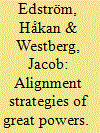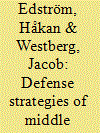|
|
|
Sort Order |
|
|
|
Items / Page
|
|
|
|
|
|
|
| Srl | Item |
| 1 |
ID:
188347


|
|
|
|
|
| Summary/Abstract |
The article aims to contribute to previous research in two main ways. First, we intervene in the debate on the stability of the present unipolar system by offering an analytical framework and an empirical approach for exploring and categorizing the actual strategies pursued by the major powers in the contemporary international system. In doing so, we present an analysis of how the strategies of the five system-determining states interact and affect the stability of the system. Second, in order to be able to explain why states pursue different strategies, we complement the analytical framework of structural realism with insights from research on Power Transition Theory (PTT). Hereby, we offer a new comprehensive theoretical approach for analyzing how asymmetric power relations affect strategic choices of major powers.
|
|
|
|
|
|
|
|
|
|
|
|
|
|
|
|
| 2 |
ID:
175679


|
|
|
|
|
| Summary/Abstract |
This article shows that all four Nordic countries, i.e., Denmark, Finland, Norway and Sweden, have adjusted their alignment strategies when responding to the changes in their external environment during the twenty-first century. Furthermore, our findings indicate a great diversity among the four states in their responses. All too often, security policy analyses cluster small states into allies and non-allies, respectively. However, this article suggests that alliance affiliation in isolation is not sufficient for explaining small states’ behavior and adjustments of their strategies. Occasionally, previous experiences of armed conflicts as well as perceptions of strategic exposure provide stronger explanatory power.
|
|
|
|
|
|
|
|
|
|
|
|
|
|
|
|
| 3 |
ID:
193519


|
|
|
|
|
| Summary/Abstract |
Scholars of Strategic Studies have seldom problematized the concept of military strategy beyond identifying the three elements constituting the phenomenon, that is ends, means and ways. Moreover, we see a need for contextualizing the presumably universal conceptualization of military strategy. This article contributes to previous research by operationalize each of the three elements one-step further, thereby introducing an analytical framework for systematic comparisons of states’ different priorities regarding military strategy. Additionally, in order to explain these different priorities, the proposed analytical framework introduces tools related to both relative power and position in the international system, and to regional systems and unit-level characteristics. The usefulness of the analytical framework is illustrated by a summary of some of our findings from a research project on comparative strategy including more than 30 states.
|
|
|
|
|
|
|
|
|
|
|
|
|
|
|
|
| 4 |
ID:
175678


|
|
|
|
|
| Summary/Abstract |
Do middle powers develop similar defense strategies? Is middle powers a useful category for exploring the diversity of strategies among different categories of states? This article presents a great variation of strategies among the selected cases. Concurrently, similarities between middle powers belonging to similar regional security complexes (RSC) are revealed. The higher degree of great power penetration into a RSC, the lesser options for middle powers to develop individual strategies and vice versa. Furthermore, by comparing our findings with the strategies of more and less resourceful states, common elements among middle powers in terms of ends, means and ways, appear.
|
|
|
|
|
|
|
|
|
|
|
|
|
|
|
|
| 5 |
ID:
193527


|
|
|
|
|
| Summary/Abstract |
This article seeks to theorize the transformation of the armed forces in Northern Europe by examining its drivers during previous NATO enlargements in the region. The exploration includes the German reunification in 1990, the Polish entry in 1999, and the joining of the three Baltic States, i.e., Estonia, Latvia, and Lithuania, in 2004. Based on these experiences, the article identifies some theoretical considerations for transformation in conjunction with the current accession process of Finland and Sweden. Based on a realist logic, we conclude that the ongoing transformation should be underpinned by a new operational design, hence considering the need for flexibility and for managing potential new expeditionary shocks. To this end, we argue that the focus must initially be internally within the Alliance, i.e., to proceed with novel operational planning for northern Europe before turning the attention to the transformation of the armed forces of the new members.
|
|
|
|
|
|
|
|
|
|
|
|
|
|
|
|
|
|
|
|
|